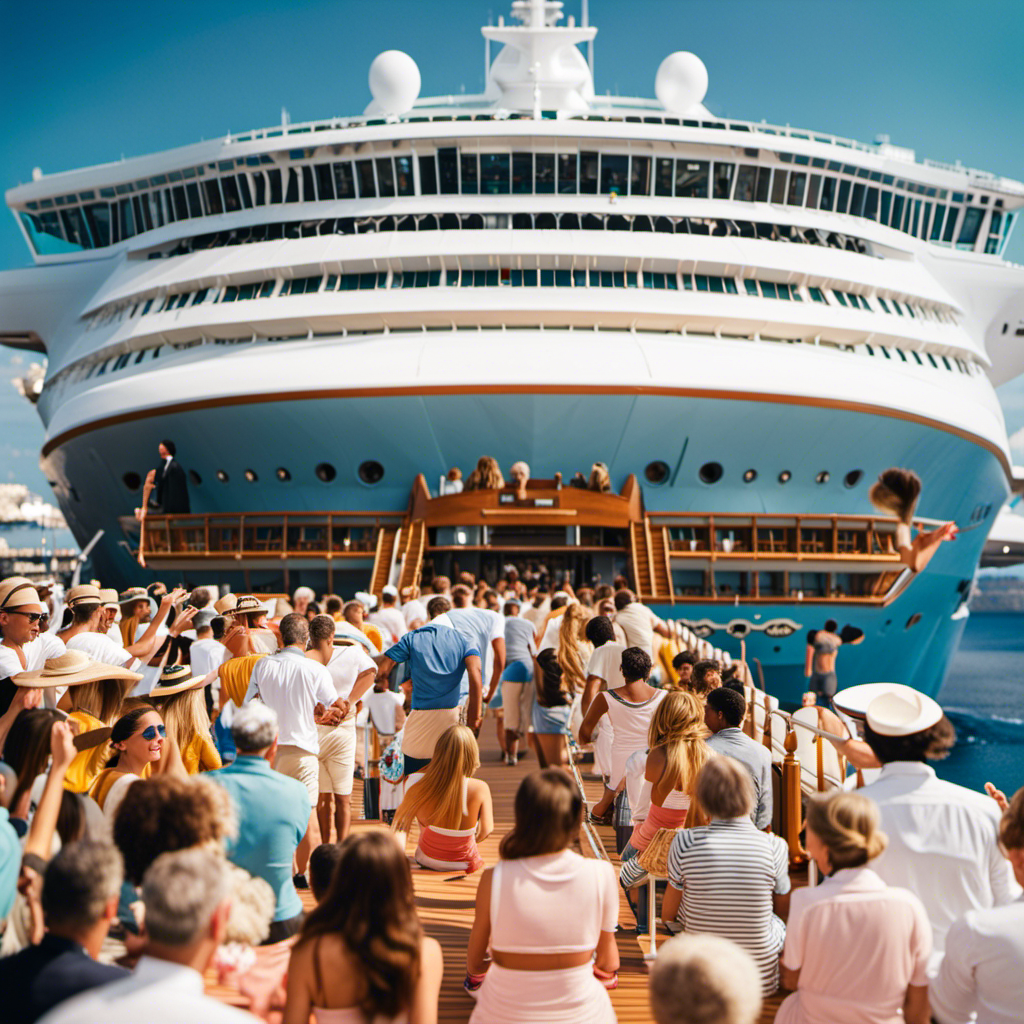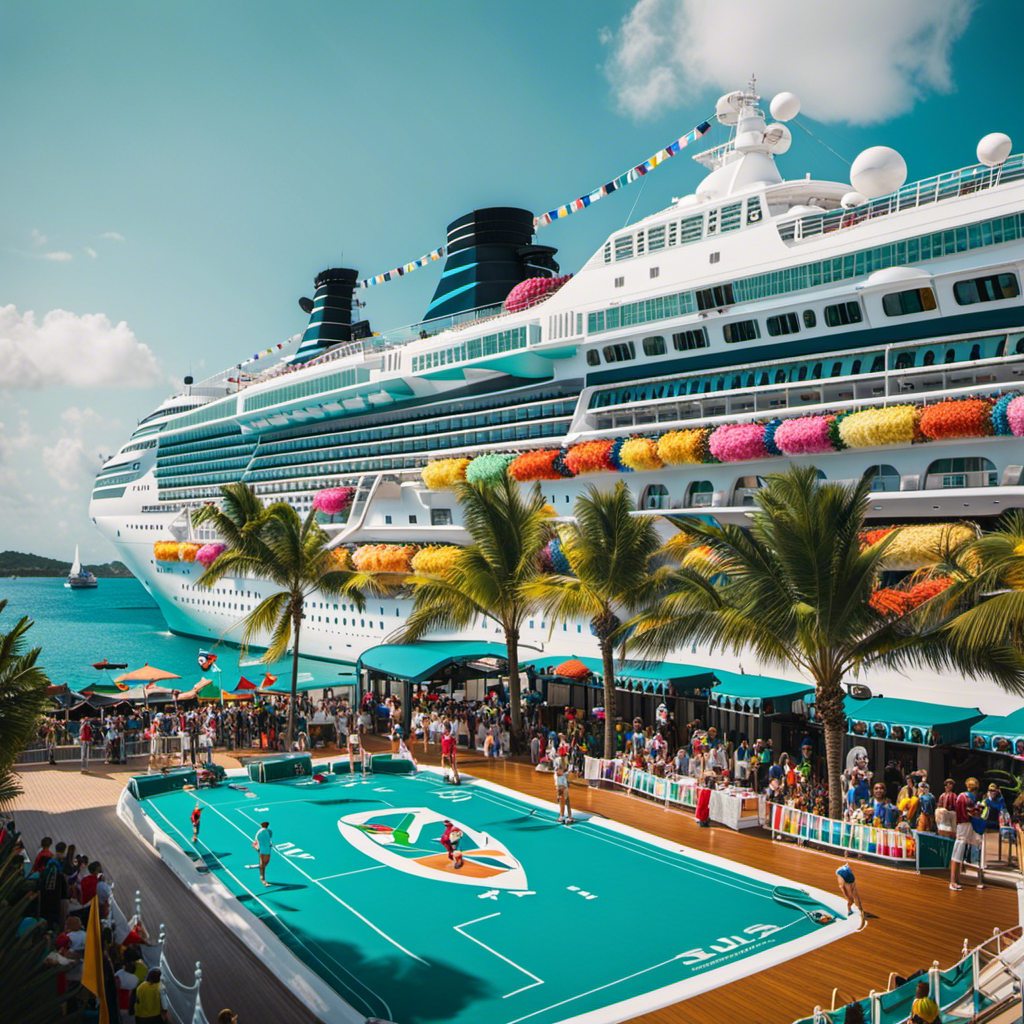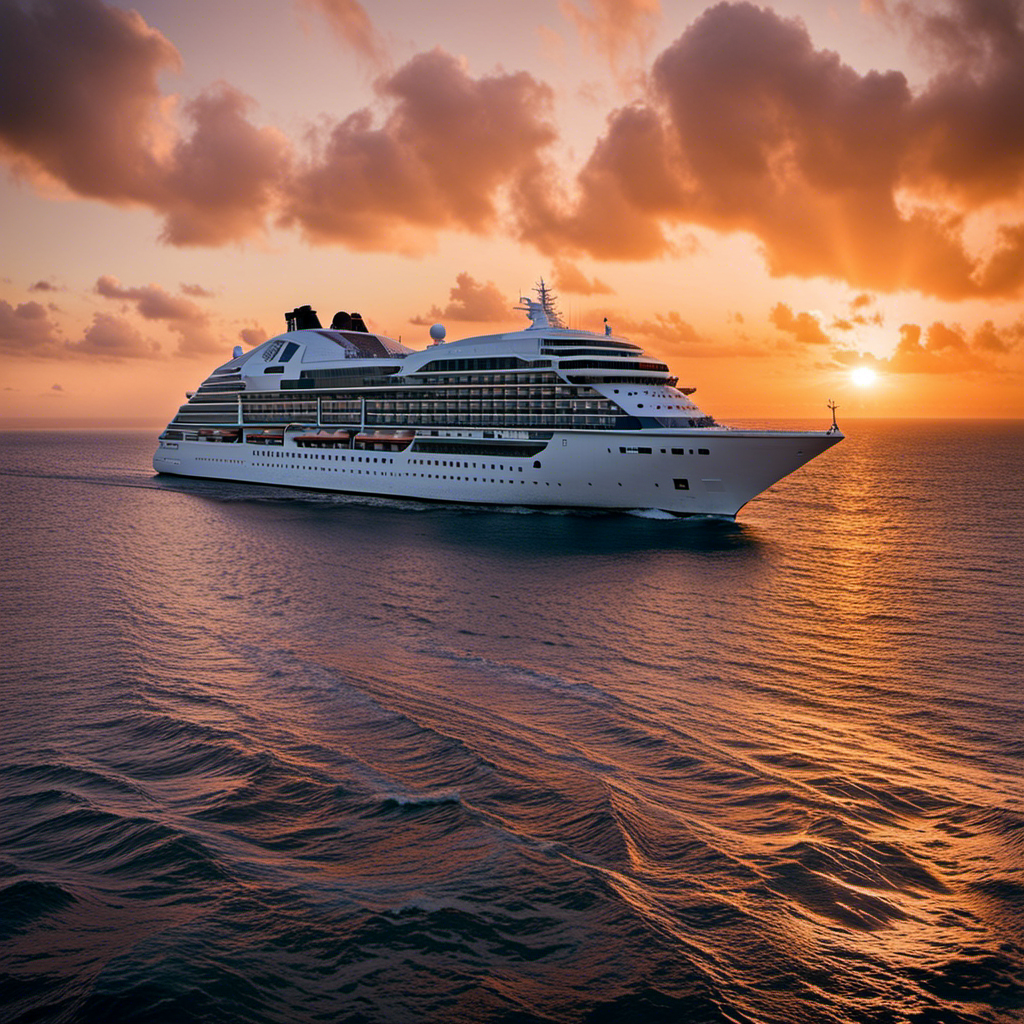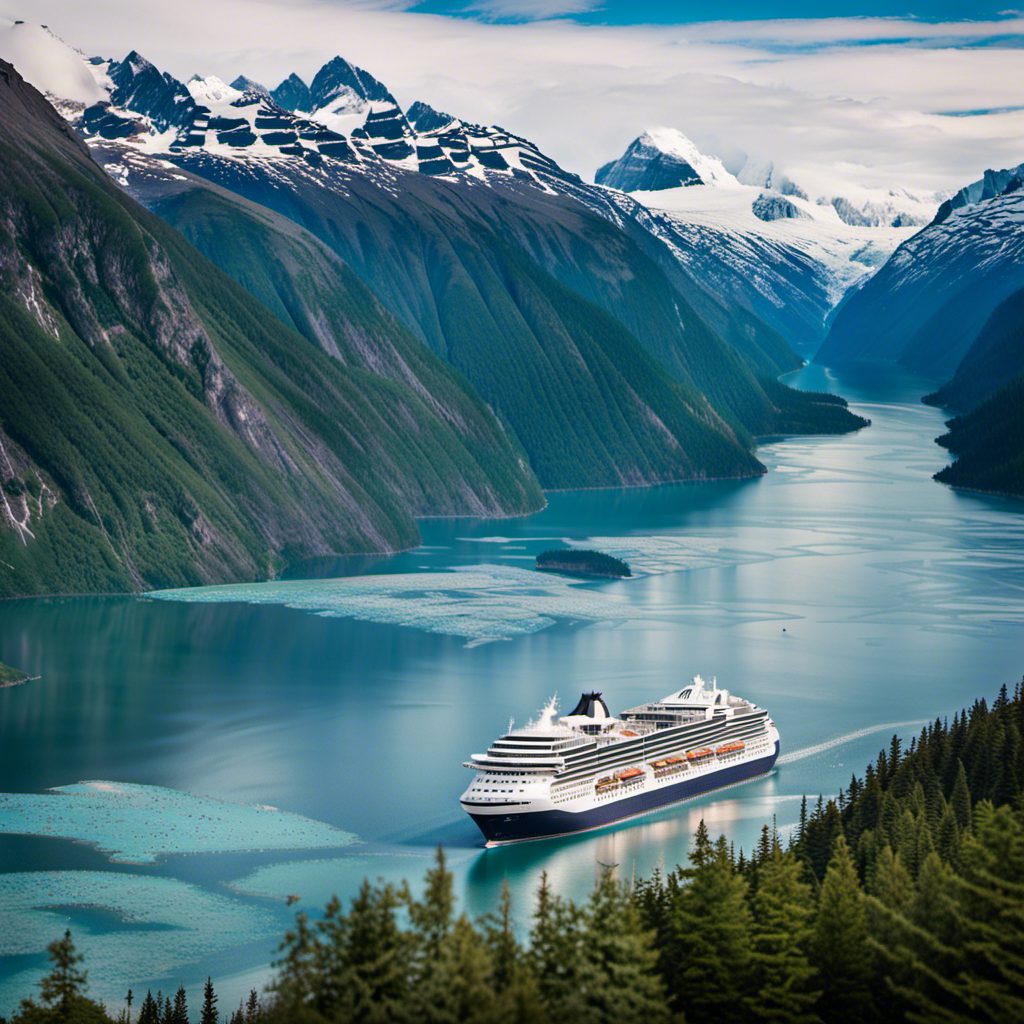Great news for everyone who loves cruising! Despite the ongoing health situation, Royal Caribbean has effectively kept virus cases to a minimum among its travelers. With over 500,000 passengers, merely 0.028% have reported instances of the virus.
CEO Richard Fain has been touting the safety of cruising and the effectiveness of the protocols they’ve implemented. Cruising resumed when cases were low and vaccines were widely distributed, but unfortunately, the Delta variant caused a spike in cases.
However, Royal Caribbean has shown that cruising can still be done safely. The protocols have been put to the test during the Delta surge, and they’ve proven to be effective in preventing outbreaks.
So, if you’re itching to set sail, rest assured that Royal Caribbean has your safety in mind.
Key Takeaways
- Royal Caribbean has carried over 500,000 passengers with only 0.028% experiencing virus cases.
- The protocols implemented by Royal Caribbean have successfully prevented big outbreaks and kept passengers healthy.
- Despite the rise of the Delta variant, Royal Caribbean has proven that cruising can be done safely.
- The decrease in non-green status among cruise ships indicates the effectiveness of Royal Caribbean’s protocols in limiting virus cases.
The Impact of the Health Crisis on the Cruise Industry
I can see that the health crisis has had a significant impact on the cruise industry, with cruising being one of the hardest-hit sectors in the travel industry.
The economic impact of the health crisis on the cruise industry has been immense. The pause in sailings and the oversight from the CDC have presented numerous challenges for cruise lines. They have had to implement new protocols and requirements to ensure the safety of passengers and crew members.
In the early days of the pandemic, cruising was heavily affected as cases surged. However, cruise lines have made changes and implemented strict protocols that have kept passengers healthy.
Despite the challenges faced, the cruise industry has shown resilience and adaptability in navigating through this crisis.
Royal Caribbean’s Success in Limiting Virus Cases
Implementing effective protocols, such as testing and vaccination requirements, has played a significant role in keeping the number of virus cases low on Royal Caribbean cruises. The effectiveness of these measures is evident in the following ways:
-
Strict testing requirements: All passengers are required to undergo pre-boarding testing, ensuring that only those who test negative are allowed on board.
-
Vaccination mandates: Royal Caribbean has implemented vaccine requirements for both passengers and crew members, reducing the risk of transmission.
-
Enhanced cleaning protocols: The cruise line has implemented rigorous cleaning and sanitation measures to maintain a safe and hygienic environment.
-
Isolation and contact tracing: In the event of any positive cases, Royal Caribbean has been able to quickly isolate individuals and trace their contacts, preventing further spread.
-
Continuous monitoring and adaptation: The cruise line has learned valuable lessons from previous experiences and has consistently updated and improved their protocols to enhance passenger safety.
These measures have not only helped limit the number of virus cases on Royal Caribbean cruises but have also provided valuable lessons for the entire cruise industry. The effectiveness of these protocols serves as a testament to the commitment of Royal Caribbean in prioritizing passenger safety.
Cruising During the Rise of the Delta Variant
Cruises have resumed amidst the rise of the Delta variant, presenting a new challenge for the industry. Lessons learned from previous outbreaks have allowed cruise lines like Royal Caribbean to adapt and implement effective protocols to keep passengers safe.
The future outlook for cruising during the Delta variant surge is cautiously optimistic. While the Delta variant has caused a significant spike in cases, Royal Caribbean has proven that cruising can be done safely. The protocols implemented by the cruise line have undergone a real-world test and have resulted in small, isolated cases.
As cases on land continue to fall, it contributes to safer sailing conditions. Moving forward, the industry will likely continue to prioritize protocols such as vaccines, testing, and masks to ensure passenger safety.
Decrease in Non-Green Status Among Cruise Ships
The decrease in non-green status among cruise ships indicates the effectiveness of the protocols in keeping passengers safe. This is evident through several key factors:
-
Low number of non-green ships: Currently, there is a low number of cruise ships with non-green status assigned by the CDC. This suggests that the protocols in place have been successful in preventing potential cases.
-
Small and isolated cases: The protocols implemented by cruise lines, such as Royal Caribbean, have resulted in only small and isolated virus cases among passengers. This demonstrates the effectiveness of these protocols in containing and managing any potential outbreaks.
-
Confidence in the protocols: The decrease in non-green status among cruise ships gives the industry confidence in the effectiveness of the protocols. This encourages cruise lines to continue implementing and enforcing these measures to ensure the safety of their passengers.
Overall, the decrease in non-green status among cruise ships highlights the positive impact of the protocols in reducing the number of cases and keeping passengers safe during their voyages.
Cruise Protocols and Passenger Safety
I have personally observed the positive impact of cruise protocols on passenger safety. The lessons learned from the health crisis have prompted cruise lines to implement new protocols and requirements. These measures have been effective in keeping passengers healthy and preventing big outbreaks.
Royal Caribbean’s success in limiting virus cases is a testament to the effectiveness of these protocols. They have carried over 500,000 passengers, with only 0.028% experiencing virus cases. This data supports the future outlook of cruising, as it shows that protocols can successfully keep passengers safe.
While the health crisis is not over and certain passengers are advised against cruising, the protocols regarding vaccines, testing, and masks are unlikely to be removed. The cruise industry can have confidence in the effectiveness of these protocols, as they have undergone a real-world test during the rise of the Delta variant.
Overall, the implementation of cruise protocols has proven to be crucial for passenger safety.
Royal Caribbean’s Effective Protocols
Implementing effective protocols has been crucial for maintaining passenger safety and preventing outbreaks. The impact of protocols on the cruise industry cannot be overstated. Here are four key points to consider:
-
Protocols have played a significant role in limiting virus cases on Royal Caribbean ships. With over 500,000 passengers carried, only 0.028% have experienced virus cases.
-
CEO Richard Fain has emphasized the safety of cruising and the effectiveness of the protocols. This demonstrates that implementing measures has been successful in preventing big outbreaks.
-
The Delta variant presented new challenges, but Royal Caribbean has proven that cruising can still be done safely. The protocols underwent a real-world test during the Delta surge.
-
The decrease in non-green status among cruise ships indicates the effectiveness of protocols. While a high percentage of non-green ships doesn’t necessarily mean a high number of cases, the decrease shows that the measures in place are working.
These points highlight the positive impact of protocols and the overall effectiveness of the measures implemented by Royal Caribbean.
Lessons Learned From the Delta Surge
Navigating the Delta surge has taught us valuable lessons about maintaining passenger safety during challenging times. The rise of the Delta variant posed a significant challenge to the cruise industry, but Royal Caribbean’s effective protocols have proven successful in keeping passengers safe. By implementing measures such as vaccines, testing, and masks, Royal Caribbean has limited the number of virus cases on their ships. This success is reflected in the data, with only 0.028% of passengers experiencing virus cases. The decrease in non-green status among cruise ships also indicates the effectiveness of these protocols. Moving forward, these lessons learned from the Delta surge will continue to shape the cruise industry’s approach to passenger safety, ensuring that cruising can be done safely even in the face of challenges.
| Lessons Learned | Effective Protocols |
|---|---|
| Vaccines | Testing |
| Masks | Sanitization |
| Social distancing | Contact tracing |
The Confidence in Cruising’s Safety
Experiencing the effectiveness of the protocols, I have confidence in the safety of cruising. The importance of data analysis cannot be overstated when it comes to assessing the public perception of cruising safety.
Here are four key points to consider:
- Cruise lines have implemented new protocols and requirements to keep passengers healthy.
- Royal Caribbean, for example, has carried over 500,000 passengers with only 0.028% experiencing virus cases.
- The protocols implemented by Royal Caribbean have prevented big outbreaks and kept passengers safe.
- The decrease in non-green status among cruise ships indicates the effectiveness of these protocols.
These facts demonstrate that cruising can be done safely, and the protocols put in place by cruise lines have been effective in minimizing the spread of the virus.
It is crucial to rely on data analysis to inform public perception and dispel any misconceptions about the safety of cruising.
The Future of Cruising Amidst the Health Crisis
Looking ahead to the future of cruising post-pandemic, one crucial aspect of ensuring passenger safety will be the role of technology. The cruise industry has already started adopting innovative technological solutions to enhance health and safety measures onboard.
From contactless check-in and virtual queues to touchless payment systems and advanced air filtration systems, technology is playing a vital role in minimizing the risk of virus transmission.
Additionally, cruise lines are exploring the use of wearable devices for contact tracing and monitoring passenger health. These technological advancements not only provide a safer environment for passengers but also offer peace of mind during their cruise experience.
As the industry continues to navigate the challenges posed by the health crisis, technology will undoubtedly play a significant role in ensuring the well-being of passengers and the future success of cruising.
Frequently Asked Questions
What Were the Specific Protocols Implemented by Royal Caribbean to Prevent Virus Cases?
Royal Caribbean implemented contact tracing, testing protocols, ventilation systems, crew vaccinations, passenger health screenings, and enhanced cleaning measures to prevent virus cases. These measures have proven effective in keeping passengers and crew safe during the health crisis.
How Did Royal Caribbean Adapt Its Protocols During the Delta Variant Surge?
During the Delta variant surge, Royal Caribbean adapted its protocols to ensure passenger safety. They maintained their strict vaccination requirements for passengers, which contributed to their success in limiting virus cases amidst the health crisis.
Are There Any Specific Examples of Isolated Cases That Occurred on Royal Caribbean Ships?
Examples of isolated cases have occurred on Royal Caribbean ships, but they have been minimal. The impact of these cases has been limited due to the protocols implemented by the company, ensuring the safety of passengers.
How Have Other Cruise Lines Compared to Royal Caribbean in Terms of Limiting Virus Cases?
In terms of limiting virus cases, other cruise lines have implemented similar measures as Royal Caribbean. Comparisons show that protocols have been effective in preventing large outbreaks, ensuring passenger safety across the industry.
Are There Any Concerns or Challenges Regarding Passenger Safety That Royal Caribbean Has Faced During the Health Crisis?
There have been passenger concerns and safety challenges during the health crisis. Cruise lines, including Royal Caribbean, have faced obstacles in ensuring passenger safety amidst the ongoing pandemic.










